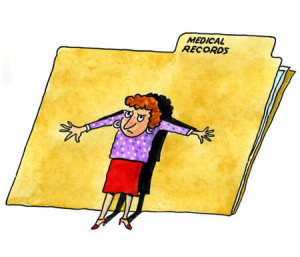
All injured workers should get a copy of their medical records at some point. Remember that your employer is being copied by the adjuster on all his/her letters to you and on some of your medical records. You should know what your doctor says about you and your injury, particularly if you are having problems with your claim.
NAC 616C.120 confirms that the injured employee has the right to inspect or obtain his health care records pursuant to NRS 629.061. That law allows a patient to request a copy of records from any health care provider, which includes therapists. The law states that the provider may charge the patient or their representative (attorney) a copy charge of 60 cents a page. Call ahead and allow the provider’s office staff a few days to get your records copied and ready for you to pick up.
Medical providers, including physical therapists, who tell injured workers that they must get a copy of their records from the adjuster are wrong in not allowing a patient to obtain records directly from the provider.
What an injured worker ordinarily gets from their doctor after each office visit is a Physician Progress Report, a one-page form which may or may not be slightly modified by individual doctors. This Physician Progress Report (PPR) gives a brief diagnosis, treatment plan, any work restrictions or off work instructions by the doctor, and the date of the next office visit. In addition to this form, the insurer receives a dictated report by your doctor after each visit. Rarely is this dictation ready immediately following an office visit. You must specifically request a copy of it from either the doctor’s office or from the adjuster handling your claim.
The reason you should request this dictation is that it may have significant errors. You may find that the doctor misunderstood you and wrote wrong statements about how your injury happened that explains why the insurer denied your claim. You might read that according to the doctor you declined certain treatment or that you have pre-existing problems in the same body part. You might also discover that your doctor is telling you one thing, but writing something completely different in this report for the adjuster.
If you are trying to get treatment for an additional body part, you might be disappointed to see in the dictated reports that your doctor didn’t even mention that you were complaining all along at every office visit about the additional body part that was injured. Adjusters routinely deny requests to treat additional body parts based on the doctor’s dictated reports that fail to ever mention your ongoing complaints to the doctor.
If you do find errors that could affect your claim or any of your legal entitlements later, you should write to the doctor and explain what the error is in the report. Ask that the doctor please correct the errors you have found. Be polite in your request and put your request in writing, copying your adjuster also. Make sure you keep a copy of your written request for corrections.
Please note that if you have an attorney who is obtaining copies of your medical records for you, it takes up to two weeks to get records when the doctor uses an outside copy service to respond to attorneys’ requests for records. If the records are essential to an upcoming appeal, your attorney will probably have you pick up the records rather than order them.













